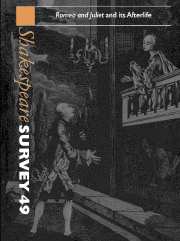Book contents
- Frontmatter
- The Challenges of Romeo and Juliet
- The Date and the Expected Venue of Romeo and Juliet
- The ‘Bad’ Quarto of Romeo and Juliet
- Shakespeare’s Romeo and Juliet: The Places of Invention
- ‘Death-marked love’: Desire and Presence in Romeo and Juliet
- Carnival and Death in Romeo and Juliet: A Bakhtinian Reading
- Ideology and the Feud in Romeo and Juliet
- Bawdy Puns and Lustful Virgins: The Legacy of Juliet’s Desire in Comedies of the Early 1600s
- Picturing Romeo and Juliet
- Nineteenth-Century Juliet
- ‘O, what learning is!’ Pedagogy and the Afterlife of Romeo and Juliet
- The Film Versions of Romeo and Juliet
- The Poetics of Paradox: Shakespeare’s Versus Zeffirelli’s Cultures of Violence
- ‘Lawful deed’: Consummation, Custom, and Law in All’s Well That Ends Well
- ‘Have you not read of some such thing?’ Sex and Sexual Stories in Othello
- French Leave, or Lear and the King of France
- The Actor as Artist: Harold Hobson’s Shakespearian Theatre Criticism
- Shakespeare Performances in England, 1994–1995
- Professional Shakespeare Productions in the British Isles, January-December 1994
- Critical Studies
- Shakespeare’s Life, Times, and Stage
- Editions and Textual Studies
- Books Received
- Index
Editions and Textual Studies
Published online by Cambridge University Press: 28 March 2007
- Frontmatter
- The Challenges of Romeo and Juliet
- The Date and the Expected Venue of Romeo and Juliet
- The ‘Bad’ Quarto of Romeo and Juliet
- Shakespeare’s Romeo and Juliet: The Places of Invention
- ‘Death-marked love’: Desire and Presence in Romeo and Juliet
- Carnival and Death in Romeo and Juliet: A Bakhtinian Reading
- Ideology and the Feud in Romeo and Juliet
- Bawdy Puns and Lustful Virgins: The Legacy of Juliet’s Desire in Comedies of the Early 1600s
- Picturing Romeo and Juliet
- Nineteenth-Century Juliet
- ‘O, what learning is!’ Pedagogy and the Afterlife of Romeo and Juliet
- The Film Versions of Romeo and Juliet
- The Poetics of Paradox: Shakespeare’s Versus Zeffirelli’s Cultures of Violence
- ‘Lawful deed’: Consummation, Custom, and Law in All’s Well That Ends Well
- ‘Have you not read of some such thing?’ Sex and Sexual Stories in Othello
- French Leave, or Lear and the King of France
- The Actor as Artist: Harold Hobson’s Shakespearian Theatre Criticism
- Shakespeare Performances in England, 1994–1995
- Professional Shakespeare Productions in the British Isles, January-December 1994
- Critical Studies
- Shakespeare’s Life, Times, and Stage
- Editions and Textual Studies
- Books Received
- Index
Summary
A development that will already be known to every Shakespeare scholar is that the Arden Shakespeare has entered a new cycle. The erstwhile ‘new’ Ardens, now to be known as Arden 2s, are beginning to be replaced with even newer Arden 3s. Arden thus affirms its position as the only Shakespeare series that has maintained a leading position throughout the century, and sets its sights firmly on the next millennium. The new cycle opens with Henry V, edited by T. W. Craik, Titus Andronicus, edited by Jonathan Bate, and Antony and Cleopatra, edited by John Wilders. Every aspect of general editorial policy has been scrutinized and many details have been carefully rethought. The scope of these changes is sufficient to ensure that the Arden 3 series will succeed as a constructive modernization of its predecessors.
The Arden general editors have successively adapted the edition to the needs of the moment while sustaining its corporate identity. On the verso of the first batch of Arden 3 title-pages we are reminded, as before, of the genealogy of general editors from W. J. Craig and R. H. Case to the present team, Richard Proudfoot, Ann Thompson, and David Scott Kastan. Craik's edition of King Henry V is dedicated to the memory of three Shakespeare scholars: amongst them are a former general editor, H. F. Brooks, who perhaps did more than anyone to establish Arden 2 as a fresh edition for post-war readers, and A. R. Humphreys, one of Arden 2's best editors.
- Type
- Chapter
- Information
- Shakespeare Survey , pp. 310 - 338Publisher: Cambridge University PressPrint publication year: 1996



